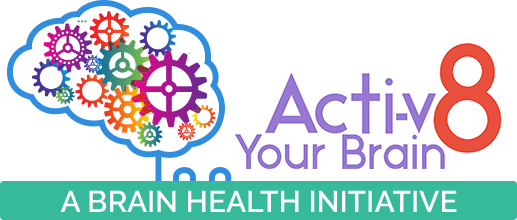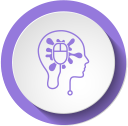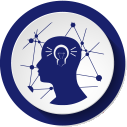
Acti-v8 Your Brain (A8YB) is a program developed by the Global Alzheimer’s Platform Foundation (GAP) to increase awareness of activities that reduce the risk of cognitive decline and may prevent the onset of symptoms of Alzheimer’s disease.
Aging causes changes in all parts of the body, including the brain. Research suggests there are things you can do as you get older to keep your brain as healthy as possible so you can stay independent for as long as possible.
Acti-v8 Your Brain provides information about eight “pillars” of brain health that are backed by research as to their effect on our brains.
As each activity boosts brain health In different ways, many studies have shown that the best results are seen when multiple Acti-v8 Your Brain pillars are simultaneously part of your daily activities.
8 Pillars of Brain Health


Stay Active
Research supports a strong link between physical activity and brain health across the lifespan. Being physically active can help you feel better, have more energy, sleep better, and improve your strength and balance, thus reducing your risk of falls. Exercise seems to protect the brain by increasing blood flow to the brain, slowing age-related brain shrinkage, strengthening the connections between different parts of the brain, and increasing the production of factors that promote learning and memory, encourage the development of new brain cells, and encourage brain cells to adapt to change.
Complete 150 minutes of moderate -to vigorous-intensity physical activity with activity periods lasting 10 minutes or more spread throughout the week • Complete muscle- strengthening activities, such as resistance training, on 2 or more days each week.
Any activity that gets your heart pumping counts as aerobic exercise—brisk walking, swimming, and dancing are just a few examples. Choosing activities you enjoy is the key to maintaining a regular exercise program.
3
ways to get more exercise:
- Take the stairs instead of the elevator
- Park farther away from the entrance and walk to your destination
- Aim to lift weights 3x/week—You can even use household items, like soup cans or gallon jugs!

Eat Well
Foods that are good for your heart and your overall health—fruits, vegetables, whole grains, nuts, and lean meats and fish—are also good for your brain. Replacing butter with unsaturated fats such as olive oil, eating less sugar and salt, and limiting your intake of alcohol are also parts of a healthy diet. Some studies have suggested that specific vitamins and nutrients may also improve brain health. These include the B vitamins (B-6, B-12, and folate); vitamins A, C, E, and K; omega-3 polyunsaturated fatty acids, which are particularly high in fish; and compounds called flavonoids that are found in fruit, vegetables, and cocoa. A healthy diet is rich in these nutrients, but the jury is still out regarding the benefits of supplements.
3
Brain Healthy Foods to eat:
- Berries
- Dark, leafy vegetables
- Dark Chocolate

Sleep Well
Getting a good night’s sleep not only makes you feel more alert and energetic, but can have long-term effects on your health. Not getting enough sleep impairs your ability to multi-task and think in creative ways and affects memory and attention.
Research has found that during sleep, the brain clears amyloid, a key protein associated with Alzheimer’s disease. Furthermore, in people with obstructive sleep apnea, a condition that causes interrupted sleep, the more severe the condition, the more amyloid builds-up in the brain. More research is needed, but per the Global Council on Brain Health, sleep is vital to brain health, including cognitive function.
Exercising regularly can also help, especially if you exercise early in the day. If you still have trouble sleeping, your doctor may be able to suggest treatments, such as cognitive-behavioral therapy for insomnia or treatments for sleep-disordered breathing.
3
steps you can take to sleep better include:
- Establishing a regular, relaxing bedtime routine
- Limiting daytime napping
- Avoiding caffeine, nicotine, and alcohol close to bedtime

Exercise Your Brain
Just as your body needs to be exercised, so does your brain. You can stimulate your mind with activities such as reading, playing a musical instrument, doing puzzles, learning new things, taking up a hobby, or volunteering. Complex and stimulating work, such teaching or constantly solving problems, has also been shown to improve cognition.
It is important to note that commercially available “brain games” that are not mentally challenging may help you get better at the game, but there is little evidence that such activity will improve your cognition for daily functioning.
Cognitive training takes this idea one step further, using activities to train specific aspects of cognition, such as memory, attention, task-switching, reasoning, and strategic thinking. Cognitive training not only improves performance on everyday tasks, it also appears to change the structure and function of the brain. Computer based and online cognitive training games have become widely available and show some promise in improving cognitive performance and, in some cases, causing physiologic changes in the brain.
3
ways to exercise your brain:
- Learn a new language
- Use your nondominant hand more often
- Volunteer

Connect With Friends And Family
Many studies have shown that, across the lifespan, increased social activity is linked to a lower rate of cognitive decline. People who have more social contacts score higher on tests of memory and executive function (the cognitive processes that help you plan, organize, and complete tasks). However, if those social interactions are stressful and negative, cognitive scores decline. Increasing your social interactions can take many different forms. Luckily, many of the activities you might choose as part of a physical or mental exercise program will also provide social benefits.
3
ways to stay connected:
- Invite friends for coffee
- Go out dancing, join a dance class, or play a sport
- Use social media to stay connected to friends

Relax And Reduce Stress
Chronic stress is known to damage the brain and cause problems with learning and memory. While we may not be able to get rid of the things that cause us stress, we may be able to protect our brains with stress-reducing techniques such as meditation, yoga, and Tai Chi. These mind-body approaches have been shown to relieve symptoms such as anxiety, depression, and insomnia. And they also change brain structure and function and reduce inflammation in brain areas involved in attention and memory. There are many different forms of meditative practice. Mindfulness-based meditation focuses your attention inward while sitting still, while active-based practices may involve movement, chanting, or other physical exercise. Both approaches stimulate areas of the brain that are involved in attention, memory, emotional regulation, and other cognitive functions.
3
ways to relax and reduce stress:
- Learn how to say “no”
- Set clear boundaries with others
- Modify expectations

Control Risk Factors
The risk of experiencing age-related cognitive decline is influenced by age and genetics, but also by factors that you can control by adopting a healthy lifestyle and getting treatment for conditions that increase the risk of cognitive impairment. Some examples of such conditions include diabetes, hypertension, obesity, and depression. Exercising regularly, eating a healthy diet, reducing stress, engaging in activities that are socially and mentally stimulating, getting enough sleep, and not smoking may all help delay or prevent these conditions, but many people will also need medical treatment to lower blood pressure and cholesterol, control diabetes and obesity, and treat depression.
3
ways to control risk factors:
- Get regular check ups
- Know your family medical history
- Strive to be active

Get Involved In Research
Many research studies help you learn more about the health of your brain. For example, some studies require brain scans that allow researchers to see the size of your brain and any protein build-up that is associated with an increased risk of Alzheimer’s disease. These scans can be costly, but when you volunteer for research all brain scans and blood tests are mostly free. In addition, studies on the effects of nutrition and exercise often provide free structured programs to help you stay fit and learn the impact of your work on your brain. Today there are many types of research studies seeking volunteers, including those that may ask you to engage in routine medical tests and cognitive assessments, to participate in regular exercise or taking a natural supplement, or to take a research medication that is being tested in Alzheimer’s. The key is you can choose a research study that is right for you and may lead to scientific breakthroughs that will help us in understanding how to keep our brains healthy.
3
ways to get involved in research:







